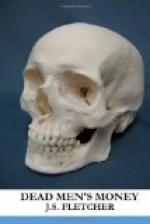Mr. Ridley smiled.
“He not only paid the fees,” he answered, “but he forced me to accept something for the poor box. He struck me as being a man who was inclined to be free with his money.”
The coroner looked at the solicitor who was representing the police.
“I don’t know if you want to ask this witness any questions?” he inquired.
“Yes,” said the solicitor. He turned to Mr. Ridley. “You heard what the witness Hugh Moneylaws said?—that Gilverthwaite mentioned on his coming to Berwick that he had kinsfolk buried in the neighbourhood? You did? Well, Mr. Ridley, do you know if there are people of that name buried in your churchyard?”
“There are not,” replied Mr. Ridley promptly. “What is more, the name Gilverthwaite does not occur in our parish registers. I have a complete index of the registers from 1580, when they began to be kept, and there is no such name in it. I can also tell you this,” he added, “I am, I think I may say, something of an authority on the parish registers of this district—I have prepared and edited several of them for publication, and I am familiar with most of them. I do not think that name, Gilverthwaite, occurs in any of them.”
“What do you deduce from that, now?” asked the solicitor.
“That whatever it was that the man was searching for—and I am sure he was searching—it was not for particulars of his father’s family,” answered Mr. Ridley. “That is, of course, if his name really was what he gave it out to be—Gilverthwaite.”
“Precisely!” said the coroner. “It may have been an assumed name.”
“The man may have been searching for particulars of his mother’s family,” remarked the solicitor.
“That line of thought would carry us too far afield just now,” said the coroner. He turned to the jury. “I’ve allowed this evidence about the man Gilverthwaite, gentlemen,” he said, “because it’s very evident that Gilverthwaite came to this neighbourhood for some special purpose and wanted to get some particular information; and it’s more than probable that the man into the circumstances of whose death we’re inquiring was concerned with him in his purpose. But we cannot go any further today,” he concluded, “and I shall adjourn the inquiry for a fortnight, when, no doubt, there’ll be more evidence to put before you.”
I think that the folk who had crowded into that room, all agog to hear whatever could be told, went out of it more puzzled than when they came in. They split up into groups outside the inn, and began to discuss matters amongst themselves. And presently two sharp-looking young fellows, whom I had seen taking notes at the end of the big table whereat the coroner and the officials sat, came up to me, and telling me that they were reporters, specially sent over, one from Edinburgh, the other from Newcastle, begged me to give them a faithful and detailed account of my doings and experiences on the night of the murder—there was already vast interest in this affair all over the country, they affirmed, and whatever I could or would tell them would make splendid reading and be printed in big type in their journals. But Mr. Lindsey, who was close by, seized my arm and steered me away from these persistent seekers after copy.




